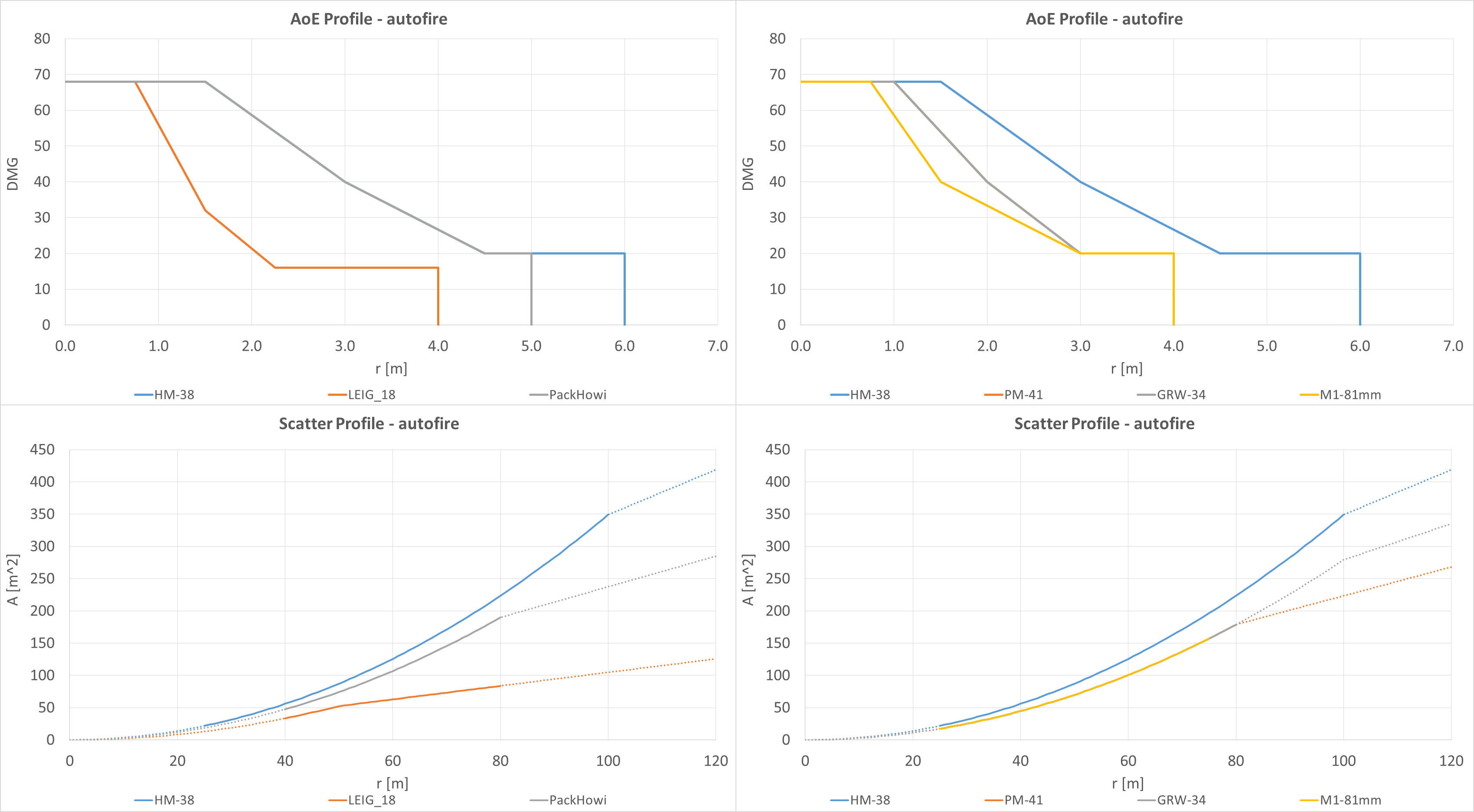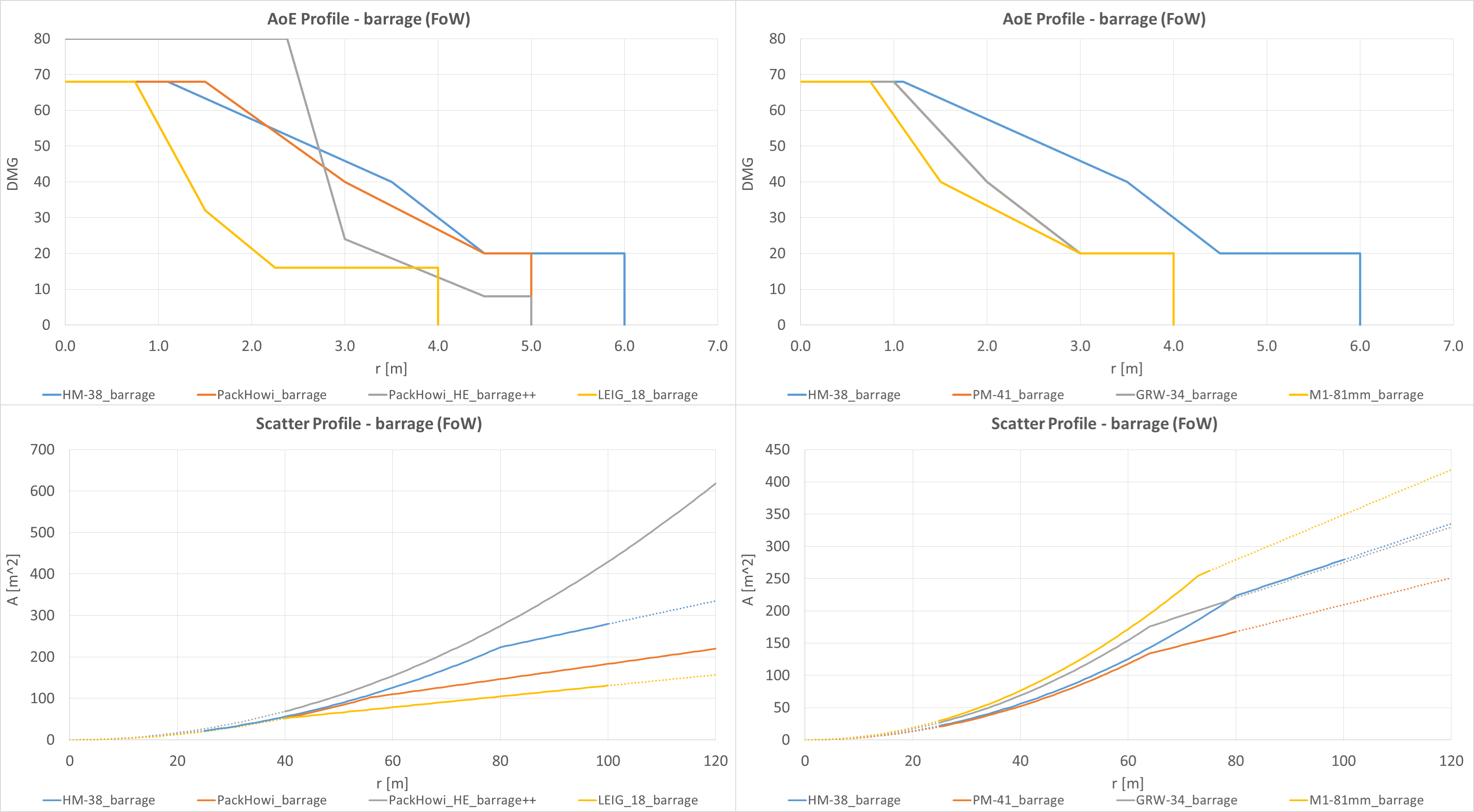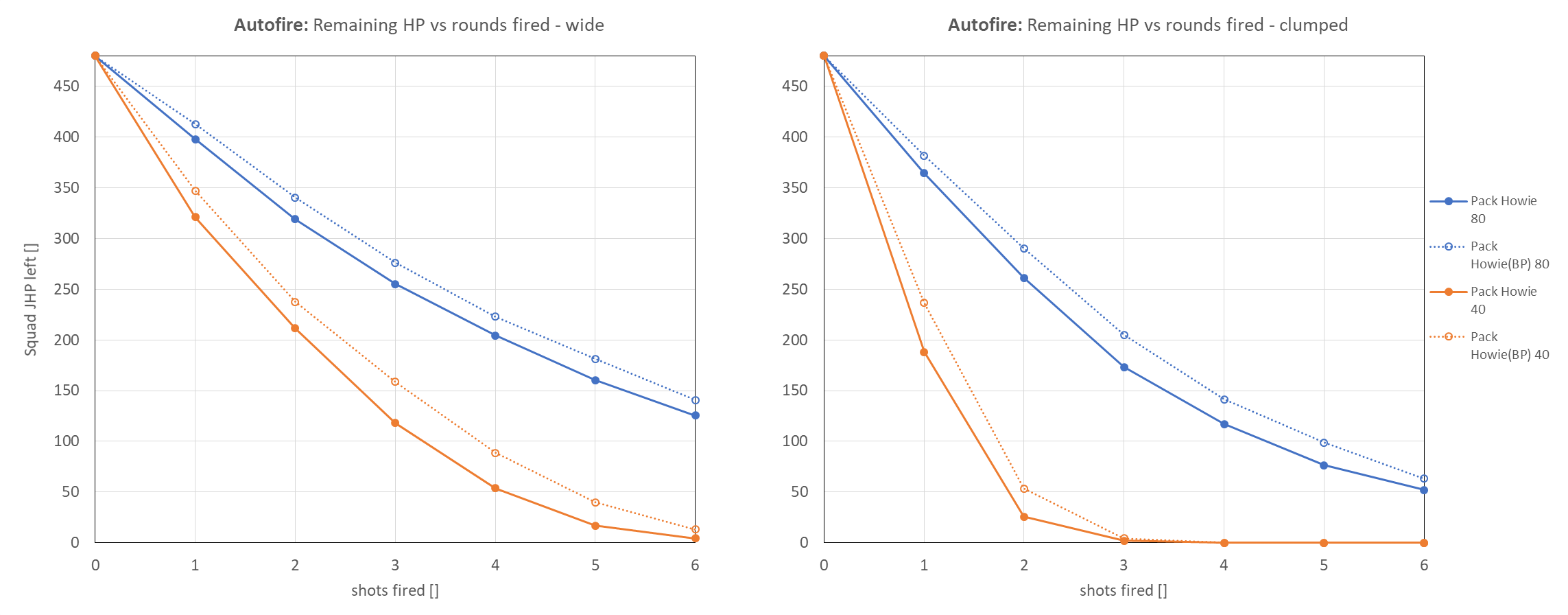while browsing through the 'Pack Howitzer is out of control' thread the other day, I thought to myself: "Wouldn't it be nice to have some sort of performance benchmark for indirect fire pieces that allowed a slightly more objective comparison of their respective power level?" Because, as it stands, discussions about what OP, UP or 'in a decent spot' are unfortunately based mostly on anecdotal evidence and subjective perception rather than reliable numbers - especially when it comes to the performance of mortars and light artillery.
This is not too surprising, however, since the raw scatter and AoE stats available from the mod tools alone are quite hard to interpret and compare. On top of that there's usually a huge variation in possible outcomes of an indirect fire salvo, which makes it difficult to use in-game tests as a reliable base for comparison as well. Hence, I’ve fired up the Scatter This! spreadsheet once more with the aim of getting performance data with sufficiently large sample size to average out some of the randomness that’s otherwise inherent to mortar and artillery fire.
The test setup I've come up with compares the autofire and barrage performance of the HM-38, PM-41, M1 and GRW-34 mortars, as well as the Pack Howitzer and leIG infantry support gun against a 6-model target squad at 80, 60 or 40 m distance, either in a clumped or loose formation. The remaining squad HP serves as the benchmark for the average damage dealt per shot and, plotted either against the number of shots fired or the time elapsed after the first shell impact, should give a rough overview of how these units stack up against each other.
I) Autofire
Before comparing the actual performance graphs, let's first have a look at how scatter and AoE damage for the units in question correlate with the distance to target / point of impact:

Fig 1: Autofire scatter and AoE profiles
Comparing the light mortars in the line-up, both scatter profiles and AoE curves are essentially identical for the Soviet and German mortar, suggesting no significant differences in performance are to be expected. The US M1, however, sports a slightly inferior AoE profile, which should result in a lower damage output (Fig 1, right panel). The heavy 120mm HM-38 on the other hand has a much better AoE damage profile and only slightly worse scatter, so it should outperform its smaller cousins by a quite a far margin. The same applies for the Pack Howitzer with its only marginally inferior AoE but slightly better scatter than the HM-38. A bit of an outlier is the leIG, since it not only has the smallest AoE but also the lowest scatter of all indirect pieces, which further scales linearly with distance from range 50 onwards (as opposed to scaling exponentially like for all the other units in this lineup). Therefore, its damage output should decrease much less with increasing distance to target as it does for the other indirect fire pieces.
With this out of the way, let's see how these units perform on average (i.e. the number average over 2,500 repetitions) against a spread-out 6 man formation:

Fig 2: Remaining squad HP after n shots fired against a 6 man squad in wide formation at 40 m (left), 60 m (middle) and 80 m (right) distance.
Clearly visible from Fig 2, the HM-38 and Pack Howie deal the highest amount of HP damage per shot at all ranges, with the heavy mortar having a slight edge due to the larger AoE radius. The leIG, as expected, performs comparatively poor at close range (worse even than the light mortars) but doesn't suffer nearly as much damage drop off at long range due to the incredibly low scatter.
Interestingly, even though the two German and Soviet light mortars have practically identical AoE and scatter areas, the PM-41 performs slightly worse in the test setup than the GRW-34. This is due to the fact that; a) the target squad formation is wider in the horizontal than in the vertical direction; and b) the PM-41 has greater distance and smaller angular scatter than the latter and only coincidentally the resulting scatter cones are identical in area. The M1 unsurprisingly fares worse than the GRW-34 despite having identical scatter, simply as a result of the inferior AoE profile.
While the 120mm mortar seemingly reigns supreme in this setup, this per-shot comparison of course neglects one additional, very important parameter: the rate of fire. Therefore, Fig 3 compares the damage dealt as function of time between the first and each subsequent impact, taking reload, aim time, windup, winddown, etc. into account:

Fig 3: Remaining squad HP as function of time elapsed after the impact of the first shell against a 6 man squad in wide formation at 40 m (left), 60 m (middle) and 80 m (right) distance.
Here the Pack Howie come out on top in terms of DPS, thanks to its relatively short delay between shots and high average damage per shell, whereas the PM-41 looks even worse as a result of having the 2nd lowest rate of fire out of all units in this lineup.
Against a more tightly packed formation (Fig 4 and 5) the amount of damage dealt per shot is unsurprisingly much higher across the board, but other than that the same general trends can be observed - with two exceptions: 1) The PM-41 is now on par with its German counterpart, since the members of the target squad are now equally far spaced in all directions; and 2) the leIG seems to perform much better in comparison, especially at max range (80 m).

Fig 4: Remaining squad HP after n shots fired against a 6 man squad in clumped formation at 40 m (left), 60 m (middle) and 80 m (right) distance.

Fig 5: Remaining squad HP as function of time elapsed after the impact of the first shell against a 6 man squad in clumped formation at 40 m (left), 60 m (middle) and 80 m (right) distance.
II) Barrage
The autofire performance of indirect fire pieces of course tells only half the story, so let's have a look at how these units differ with respect to the barrage ability in the second part of this comparison. Again, the respective scatter and AoE profiles give a good first impression what general trends should be expected (note that, since for the most part barrages are targeted into the FoW, the tests and the scatter graphs below were calculated taking the FoW multiplier into account)

Fig 6: Barrage scatter and AoE profiles
Again, the two Eastern Front light mortars use the same AoE profile as in the autofire case, but this time the PM-41 should clearly outperform the GRW-34 due to the much lower barrage scatter. In case of the two "heavy" indirect pieces, the HM-38 and Pack Howie have almost identical scatter up to range 60, after which the latter clearly pulls ahead and is thus expected to deal higher average damage at 80 m.
In addition, the Vet2 HE shells for the Pack Howie are included in this comparison, which should show the highest variation in performance as a function of range due to having exceptionally high scatter.
How these units compare vs each other in detail can be seen from Fig 7 & 8. Notably, in this setup the max number of shots simulated was limited to the number of shells fired per barrage salvo (6 for the HM-38 and 4 for all other units).

Fig 7: Remaining squad HP after n shots fired against a 6 man squad in wide formation at 40 m (left), 60 m (middle) and 80 m (right) distance.

Fig 8: Remaining squad HP as function of time elapsed after the impact of the first shell against a 6 man squad in wide formation at 40 m (left), 60 m (middle) and 80 m (right) distance.
As expected, the 120mm mortar remains superior in terms of damage per shot up to a distance of 60 m, after which the Pack Howie takes over the top spot. This is amplified by the fact that the HM-38 has a pretty poor rate of fire for the barrage and, in fact, fires only two shells in the same interval the Pack Howitzer fires three. Another interesting observation is that the HE shells, despite being capable of OHK'ing a full-health model (or even whole squad, depending on the unit spacing), do less damage on average than the regular Pack Howie barrage and should thus only be used at very close range against infantry - if at all.
Squad spacing has again a noticeable effect on the overall damage dealt per shot, while the general performance trends remain largely unchanged, as can be seen from Fig 9 & 10.

Fig 9: Remaining squad HP after n shots fired against a 6 man squad in clumped formation at 40 m (left), 60 m (middle) and 80 m (right) distance.

Fig 10: Remaining squad HP as function of time elapsed after the impact of the first shell against a 6 man squad in clumped formation at 40 m (left), 60 m (middle) and 80 m (right) distance.
So, to wrap up this already much too long post, I hope this little head-to-head comparison could shed a bit of light on how these indirect fire pieces perform on average and how this is correlated to their respective scatter and AoE profiles. Last but not least, I of course also hope that at least some of you may find this info useful. Any thoughts?
-MMX-
EDIT 07/01/2020:
Apparently I hadn't used the correct AoE profile for the US-M1 mortar, but that of the mortar halftrack in the calculations by accident. This made the M1 look quite a bit better in comparison as it actually is. Updated the OP and all relevant graphs with the correct data.


















 .
.






 cblanco ★
cblanco ★  보드카 중대
보드카 중대  VonManteuffel
VonManteuffel  Heartless Jäger
Heartless Jäger 